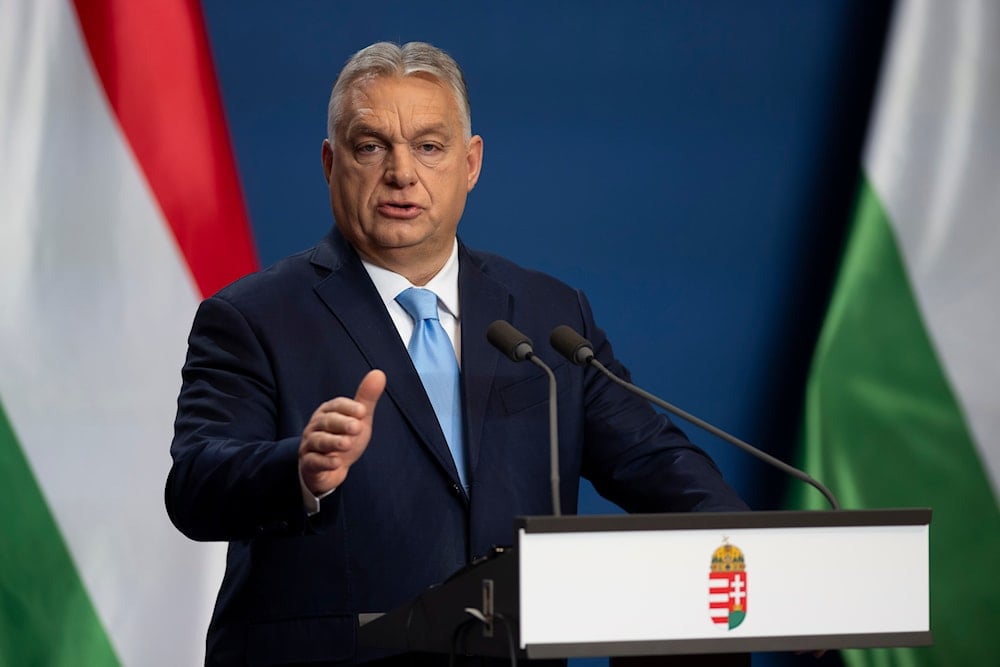Hungary plans anti-Ukraine bloc with Czechia, Slovakia
Hungarian PM Viktor Orban is working to form a Ukraine-skeptic alliance with Czechia’s Andrej Babis and Slovakia’s Robert Fico, potentially challenging EU efforts to support Ukraine militarily and financially.
-

Hungarian Prime Minister Viktor Orban speaks during his annual international press conference in Budapest, Hungary, on December 21, 2024. (AP Photo/Denes Erdos)
Hungary is pushing to form a Ukraine-skeptic alliance within the European Union, seeking alignment with Czechia and Slovakia ahead of key European summits, according to a senior political adviser to Prime Minister Viktor Orban.
A report by POLITICO stated on Tuesday that the plan aims to unite Hungarian Prime Minister Viktor Orban, Czech politician Andrej Babis, and Slovak Prime Minister Robert Fico to coordinate positions on Ukraine-related policies and potentially hold joint strategy sessions before European Council meetings.
Though still informal, the emerging alliance could pose a challenge to EU efforts to keep funding Ukraine militarily and financially, particularly as divisions among member states are growing more visible.
Balazs Orban, the Hungarian premier’s political director, told POLITICO that he believes a coordinated bloc "will come" and "be more and more visible." He likened the effort to the previous coordination among Visegrad countries during the EU migration crisis, when Hungary, Poland, Czechia, and Slovakia jointly opposed migrant relocation schemes.
According to the POLITICO report, both Fico and Babis have echoed Orban’s skepticism of the EU’s Ukraine policy, calling for dialogue with Moscow, rather than intensified sanctions or military aid. In particular, Babis has faced criticism for allegedly being too close to Orban, with Czech officials warning he could serve as Hungary’s proxy in Brussels.
Visegrad 4 split and new political landscape
The original Visegrad 4 alliance fractured following the war in Ukraine. Poland adopted a strongly pro-Ukraine stance, distancing itself from Hungary’s opposition to sanctions on Russia and military aid to Kiev.
While Orban’s vision for a renewed bloc excludes Poland, now led by pro-Ukraine Prime Minister Donald Tusk, the emerging Visegrad 3 would include Hungary, Slovakia, and potentially Czechia, should Babis form a government after his party's electoral win. But neither Fico nor Babis has formally signed Orban’s plans; shared positions on Ukraine indicate growing convergence, with future cooperation in the European Council under discussion.
According to POLITICO, beyond the European Council, Hungary is also broadening its alliances in the European Parliament. According to the report, Orban’s ruling Fidesz party, now part of the far-right Patriots for Europe group, is exploring cooperation with the European Conservatives and Reformists, Europe of Sovereign Nations, and even certain leftist factions, according to Balazs Orban.
He suggested that discontent with European Commission President Ursula von der Leyen could eventually lead to a shift away from the centrist majority that supported her reelection.
"We are looking for partners, allies on every topic," he said, highlighting Hungary’s growing think tank presence in Brussels, led by the Mathias Corvinus Collegium, which has transatlantic ties and receives significant funding from Orban’s political allies.

 3 Min Read
3 Min Read











